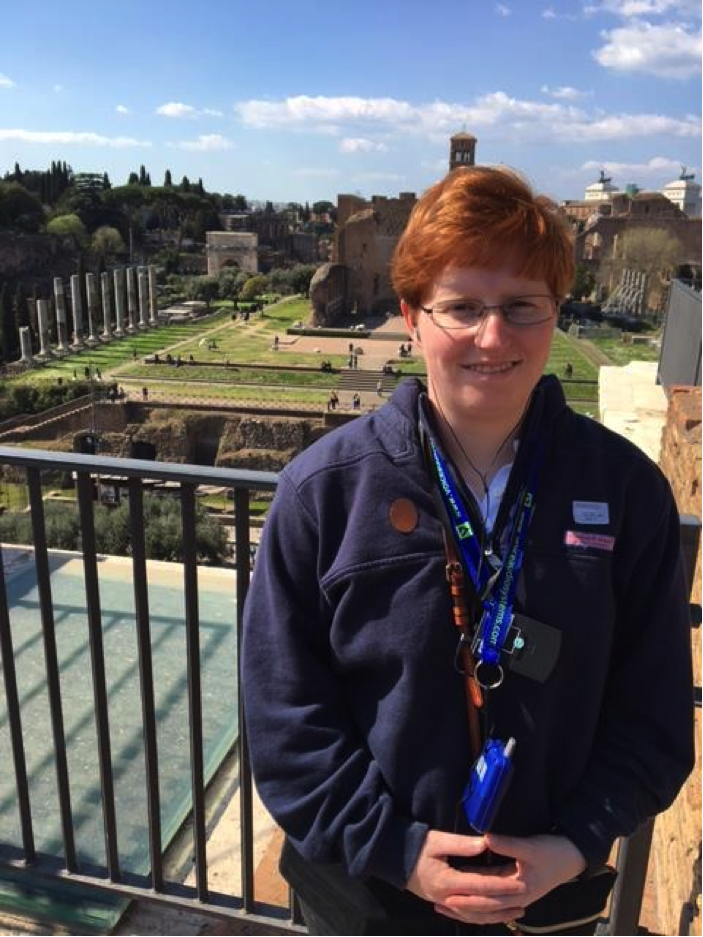
Editor’s Note: Anne Holly ’17 of York, Pennsylvania, graduated in May with a bachelor’s degree in economics and a minors in mathematics. She was a captain of the Connecticut College women’s squash team, which is ranked No. 28 in the country. At Conn, she was also a member of the Peggotty Investment Club, Outdoors Club, Tennis Club, and is Green Dot-trained. She thinks Conn has a great mascot and loves being a Camel. She was a guest blogger for The Experience this spring.
This spring, I traveled to Italy for spring break with my parents. We spent previous breaks traveling around France and London so I could experience other cultures. I decided not to study abroad during my time at Conn because of my commitment to the squash team, but my experience traveling to Italy was exponentially more informative because of my Connecticut College education and my study of Latin.
Some of my favorite and most enjoyable classes at Conn have been those that I took outside of my major and minor. These classes challenged me to think a different way, to question what I know and how I learned it, to interpret the facts at face value without any biases or prejudices, and to form an opinion about subjects that were totally new to me. My first Classics course at Conn was one such class.
To fulfill my language requirement, I consulted with classics professor Nina Papathanasopoulou at an academic fair during Orientation and enrolled in her yearlong elementary Latin class. I wanted to have the most in-depth experience of the language and I believe that if you are going to learn something, you might as well start from the beginning and do it well.
I was in a small class of seven students, and Professor P. was engaged with all of us. She asked us what we were most interested in and tailored the class to our needs. The small class size allowed us to receive individual attention, but it also fostered team spirit. Most importantly, Professor P. showed us how Latin and the study of Classics can be connected throughout the curriculum, which is the basis of the new curriculum, Connections. While we were learning new vocabulary, we also translated passages of poetry, songs and historical accounts. We used our knowledge of Latin to engage in a number of activities that would enhance our learning, and we memorized Latin speeches to work on public speaking. We learned the Latin names of the plants in our arboretum. We translated Latin love poems on Valentine’s Day. We learned about how the Roman people lived and what they ate. So we learned more than how to read another language; we learned how the language reflects a culture that still influences us today.
When visiting the Colosseum or the Roman Baths of Caracalla (Thermae) with my parents, we noticed that much of the structure is missing, which made it difficult to conceptualize what we were viewing. But the buildings before me came to life when I read the Latin inscriptions on their walls and I was able to apply what I learned in the classroom to what I was seeing in different places around the globe. In class, we translated a passage by Nero describing what he witnessed at the Baths: splashing, shouting voices, grunts from exercise, and the slamming of weights. Nero’s explanation helped me envision the Baths as a spa, health club, and pool, and helped me see Rome through the eyes of the Romans. Knowing what their daily routine was like allowed me to fully understand what I was seeing and why it was so important.
Though I’m not a classics major, taking a yearlong Latin course made a significant impact on how I see the world, and my professor emphasized the impact of Latin in our world today. Instead of simply enjoying the beautiful plants in the College’s arboretum, I can now understand their Latin names. I know how the English months got their names. I can use standard Latin abbreviations like i.e. or cf. more comfortably. And I can read Connecticut College’s motto, “Tanquam lignum quod plantatum est secus decursus aquarum,” which means, "Like a tree planted by rivers of water (that bringeth forth its fruit in its season)."
My language study at Connecticut College greatly enhanced my trip and experience in Italy. It was great to “put my liberal arts into action as a global citizen” just before graduation and I look forward to continuing to do so.
